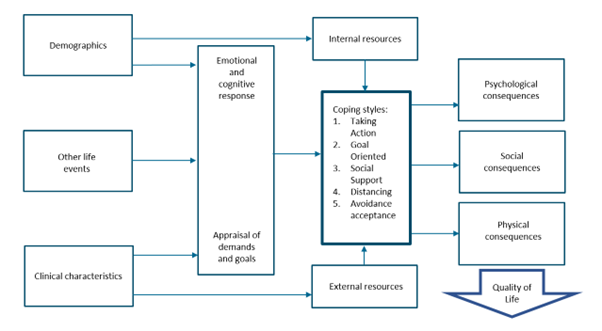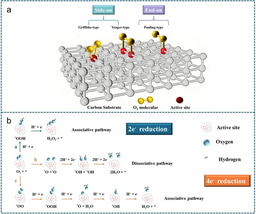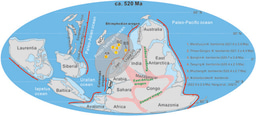Coping mechanisms of people with Parkinson’s Disease
Published in Healthcare & Nursing, Neuroscience, and General & Internal Medicine
Explore the Research

Determinants of coping styles of people with Parkinson’s Disease - npj Parkinson’s Disease
npj Parkinson’s Disease - Determinants of coping styles of people with Parkinson’s Disease
Parkinson’s disease (PD) is a progressive and chronic neurodegenerative disease that is characterized by an array of potentially debilitating symptoms, such as slowness of moving, rigidity, tremor, cognitive impairments, fatigue, hallucinations and depressive symptoms. As the disease progresses, the impact of PD on daily lives increases, and consequently, people with PD experience the need to find new ways to adapt to new changes and challenges. Previous studies revealed that there are considerable interindividual differences in the coping mechanisms of people with PD with stressful life events. However, it remained largely unclear how the sociodemographic and disease-related characteristics of people with PD affect their coping mechanism. This is an important gap, as insight on an individual patient’s coping mechanism would facilitate health care professionals to tailor care to their unique needs. We addressed this gap in 935 people with Parkinson’s. This project was embedded in the PRIME-NL study, which is a prospective healthcare evaluation study in the Netherlands.
The team behind this study spanned researchers in different stages of their careers with complementary professional backgrounds. The junior lead of the study, Ms Eva Prins, was an undergraduate student of Neuroscience and Biology at Utrecht University when this study started. Her daily supervisor, Ms Angelika Geerlings, was a PhD student on personalized care for people with Parkinson’s at Radboud University Medical Center. The Principal Investigator, Dr Sirwan Darweesh, had overseen the design of the PRIME-NL study in the year prior to the current study, building on a background in Epidemiology at Erasmus Medical Center & Harvard TH Chan School of Public Health and in clinical neurology at the Radboud University Medical Center. The team also included complementary expertise from a movement disorders specialist (Prof Bas Bloem), a person-centered care expert (Dr Marjan Meinders) and an epidemiologist (Prof Yoav Ben-Shlomo). The latter was visiting Radboud University Medical Center (from Bristol University) at the time of this study as a Radboud Excellence Professor, to catalyze the collaboration between PRIME-NL and its sister study in the United Kingdom (PRIME-UK). The researchers were supported by an energetic team of Participant Recruitment & Retention officers, who sustained personal contact with study participants on a regular basis.
In this study, coping mechanism were measured using the Ways of Coping Questionnaire (WCQ) and analyzed using factor analysis, which enabled us to identify five different coping mechanisms in people with Parkinson’s. These coping mechanisms were characterized respectively by (i) taking action and emphasizing the positive, (ii) distancing and fantasizing, (iii) goal oriented and planful problem solving, (iv) seeking social support, or (v) avoidance and acceptance. We then used linear regression models to examine associations of potential determinants with these coping mechanisms. These analyses revealed that age, gender, education and anxiety were associated with coping mechanisms (Figure 1). Several coping mechanism-specific associations are highlighted in the next paragraph. A comprehensive overview of the results is beyond the scope of this ‘Behind the Paper’-blog, but is presented in the paper (see link below).

Younger participants and women more commonly (than other participants) had a coping mechanism characterized by seeking social support, whereas older participants tended to have a coping mechanism characterized by avoidance and acceptance. Women also more commonly had a coping mechanism characterized by distancing than men. Participants with higher educational attainment tended to have a goal oriented coping mechanism. Participants with higher levels of anxiety or higher levels of depressive symptoms more commonly had a coping mechanism characterized by distancing. In secondary analyses, we did not observe robust associations between coping strategies and the health-related quality of life of people with PD. Taken together, these results demonstrate that the coping behavior of people with PD is influenced by both psychological status and personal traits.
Behind the scenes, a major development during the early stages of this study was that the COVID-19 pandemic erupted. From a methodological point of view, that development provided us with a unique (and unforeseen) opportunity to assess coping mechanisms of people with Parkinson’s who were in the midst of an historic societal crisis, which allowed participants to draw from recent or ongoing stressful events. This likely enhanced the accuracy of the assessment of their coping mechanisms. From a personal point of view, the COVID-19 crisis also had implications for members of the research team, as well as on the team dynamic. For instance, the lead researcher of this article performed a considerable part of her early work on this study remotely, and only met the other members of the research team in person after 7 months. As a consequence, the eruption of the COVID-19 crisis ironically tested the utility of the researchers’ own coping strategies. Therefore, this study highlights how profoundly research can be affected by the context in which it is conducted.
By the time this study was published, Ms Prins had successfully completed her undergraduate degree. She has continued her research in this field, in parallel to pursuing a graduate degree in Medical Neurobiology at Radboud University Nijmegen. Ms Geerlings is due to finish her PhD in 2024, having completed several related research projects, including a recent study on the caregiver burden experienced by informal caregivers of people with PD, which was also embedded in the PRIME-NL cohort. In a broader context, the current study has fueled further ongoing research on coping strategies of people with PD, in particular on whether the enhancement or discouragement of certain coping strategies is feasible and can help people with PD sustain their functional independence. Once such knowledge becomes available, it could facilitate firm recommendations to healthcare professionals on how to incorporate an individual’s coping strategy within the framework of personalized healthcare provision.
Follow the Topic
-
npj Parkinson's Disease

This journal publishes original basic science, translational and clinical research related to Parkinson's disease, including anatomy, etiology, genetics, cellular and molecular physiology, neurophysiology, epidemiology and therapeutic development and treatments.
Related Collections
With Collections, you can get published faster and increase your visibility.
Cognition - preclinical models, and preclinical unmet need
Publishing Model: Open Access
Deadline: Jul 27, 2026
Environmental risk factors for Parkinson’s disease
Publishing Model: Open Access
Deadline: May 13, 2026





Please sign in or register for FREE
If you are a registered user on Research Communities by Springer Nature, please sign in